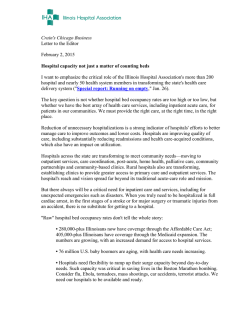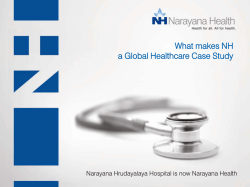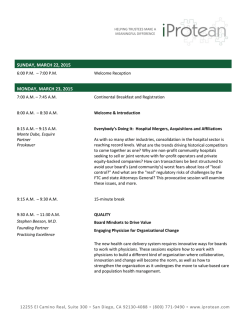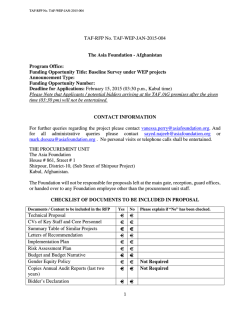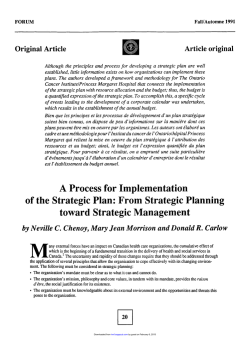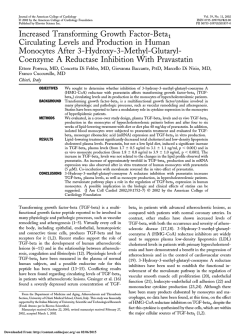
Frequently Asked Questions (PDF 541KB)
Frequently Asked Questions What is Transforming Health? ................................................................................................................ 2 Why do we need to transform our health system? ................................................................................. 2 Does Transforming Health cover all of South Australia? ........................................................................ 3 What are the Clinical Advisory Committees? .......................................................................................... 3 What is the purpose of the Clinical Advisory Committees? .................................................................... 3 What are principles and standards? ....................................................................................................... 3 What is proposed by Transforming Health?............................................................................................ 4 What is the process for Transforming Health? ........................................................................................ 4 What do these changes mean for staff? ................................................................................................. 6 How can we afford these changes? ........................................................................................................ 6 Will we continue to need all the sites we currently have? ....................................................................... 7 Will we have fewer beds? ....................................................................................................................... 7 Is administration of the health system being addressed? ....................................................................... 7 Are the proposals outlined in the Proposals Paper the final decisions? ................................................. 7 What about the work already underway in the health system? .............................................................. 8 How can I get involved? .......................................................................................................................... 8 What is Transforming Health? Transforming Health is about ensuring South Australians have the best quality healthcare system into the future. It has become clear that we need to change the way we manage our system so that we can meet changing community needs and advances in treatments and technology. Through the Transforming Health process – which involves engaging doctors, including surgeons, nurses and midwives and allied and scientific health professionals in re-designing the system – we realised that we need to improve the consistency of our healthcare, so that the many areas of excellence that we have in South Australia can be replicated across our system. The proposals outlined in the Delivering Transforming Health Proposals Paper (PDF 1675KB) were developed with groups of clinicians and are focussed on achieving the quality principles that they consider essential for an effective health system. Responses to the Transforming Health Discussion Paper (PDF 1140KB), and the Health Summit held in November 2014, have also been considered in forming these proposals. The overarching aim is this: a more streamlined healthcare system that provides better service for patients. We want to make sure patients’ experiences are a seamless journey through all stages of care. Best care. First time. Every time. Why do we need to transform our health system? We have many areas of excellence – but our health system does not consistently deliver the quality of care we all expect from a modern health system. The changes we will make through Transforming Health are all about delivering high quality care. This includes being able to respond better as our health needs change, technology advances and specialised skills are needed in our system. The care we provide must be necessary, represent value and contribute to improvements in health. The challenges of changing healthcare needs mean we must think differently, work differently and deliver healthcare differently. This is why we need to transform our system. Our health needs have changed Hospitals were designed for a previous era, when their main use was for medical crises such as heart attacks or major accidents. Now hospitals manage people who are more likely to have multiple, complex and often chronic conditions. Diseases such as diabetes are far more common. An average of 40% of our hospital patients now are 65-85 years old. We need to provide better coordinated care for chronic disease that is more responsive and closer to home. Technology has changed We are experiencing unprecedented growth in technology and innovation. This is helping deliver incredible improvements in healthcare and changes to how healthcare is delivered. Technology has changed the type of equipment and expertise needed to deliver healthcare. Advances in medical science have improved practices and recovery times, with day surgery now possible for many procedures. Specialised skills are needed Medical advances need highly trained staff using specialist equipment. Some specialty services need to treat a minimum number of patients to meet essential safety and quality standards. This means that the appropriate level of specialist care and expertise can only be provided at dedicated specialist sites. Consistency in quality is needed The Clinical Advisory Committees have found many areas of excellence but have also found areas where we are not delivering a consistent quality of care. Does Transforming Health cover all of South Australia? Transforming Health must be a whole-of-system transformation but we have to start where the impact is greatest – our metropolitan hospitals. This is where most services are delivered and specialty services are located. We want to get our metropolitan hospitals delivering consistent quality care before we tackle the full spectrum of the health and community sector. We will then know how to best apply the agreed standards to our country hospitals. What are the Clinical Advisory Committees? The medical, nursing and midwifery, and allied and scientific Clinical Advisory Committee members were selected to include a diverse range of clinicians and healthcare workers from across the state. Membership of the Clinical Advisory Committees is available here. What is the purpose of the Clinical Advisory Committees? The Clinical Advisory Committees have assessed the available data and compared the evidence to recommend quality principles and standards that should be provided in South Australia. A gallery walk of information reviewed by the Committees is available here. The recommended principles and standards feature in the Discussion Paper and guide the proposals in the Delivering Transforming Health Proposals Paper. What are principles and standards? Principles provide guidance for decision making and express our collective expectations of our health system. Six principles of quality will guide how we transform the South Australia healthcare system: 1. Patient centred 2. Safe 3. Effective 4. Accessible 5. Efficient 6. Equitable Standards provide guidance on achieving consistent quality care. They state what the community and staff should expect from our health system. The Standards in the Proposals Paper do not cover every aspect of public healthcare, but detail overarching standards for the whole system and then focus on four aspects of care: General Unscheduled Care (or emergency care) Routine Elective Care (elective medicine and surgery) Women’s and Children’s Care Selected Specialties The Standards will be regularly reviewed, monitored and assessed to ensure they are effective in driving quality. What is proposed by Transforming Health? Achieving consistent, high quality care means changes across the entire healthcare system. The Delivering Transforming Health Proposals Paper (PDF 1675KB) outlines the State Government’s proposed plan for the future of South Australia’s health system. Key proposals include: Enhanced emergency care: Major Emergency Departments will treat ‘once-in-a-lifetime’ emergencies, such as heart attacks and major accidents, with senior staff 24/7. The Queen Elizabeth Hospital and Modbury Hospital Emergency Departments will continue to support local communities, but life-threatening emergencies will do directly to sites with 24/7 specialist care. The Noarlunga Hospital Walk-in Emergency Clinic will be established, replacing the existing model of care, and will include a physical upgrade. Specialised complex services: Statewide, specialised services like cardiothoracic surgery and stroke will operate under a single service, multiple site model to create consistent quality of care and better outcomes for patients. Comprehensive rehabilitation services: Rehabilitation services will be integrated into five hospitals across metropolitan Adelaide, while Rehabilitation at Home services will be expanded. Services for older people: A single, statewide model of care for orthogeriatrics will be developed to shorten hospital stays and improve health outcomes for older people. Psychogeriatric services will also be improved and a nurse-led recuperation centre will provide care for people who don’t need to be in hospital but who are not yet able to return home. Specialist centres for elective surgery: Specialist centres will be created for different types of elective surgery to reduce waiting times, shorten stays in hospital and provide better health outcomes for patients. Women’s and Children’s care: The acceleration of relocating the Women’s and Children’s Hospital to the new Royal Adelaide Hospital site will be investigated and statewide services will be under the care of the Women’s and Children’s Hospital. Mental health: Where appropriate, mental health consumers needing acute care will be admitted directly to a mental health bed, avoiding the emergency department altogether. Better services for Veterans: A Centre of Excellence for the treatment of Post-Traumatic Stress Disorder will be developed and improved pathways of care will provide Veterans with the high-level expertise and facilities they need. Ambulance services: Ambulance services will be expanded to ensure patients go straight to the right hospital for their condition. Community and other services: People who don’t need to be in hospital but who are not yet able to return home will be cared for in a nurse-led recuperation centre. Better use of community-based programs and professionals will mean patients can avoid unnecessary hospital admissions. Read the Delivering Transforming Health Proposals Paper to find out more about the proposed changes and provide your feedback online by Friday 27 February 2015. What is the process for Transforming Health? Clinical Advisory Committees June 2014 - Present The Minister for Health appointed three Clinical Advisory Committees of doctors, including surgeons, nurses and midwives, and allied and scientific health professionals, to look at our current health system and understand what we do well and where we can improve. Each Committee was co-chaired by leading professionals in their fields: Medicine, co-chaired by Adjunct Associate Professor Rodney Petersen and Associate Professor Chris Zeitz Nursing and Midwifery, co-chaired by Ms Vanessa Owen and Ms Jackie Wood Scientific and Allied Health, co-chaired by Mr Paul Lambert and Ms Heather Baron These groups of health professionals developed quality standards for our healthcare services which, if supported, will result in changes and improvements to our metropolitan hospital system. Consultation on the Transforming Health Discussion Paper 17 October – 21 November 2014 On 17 October 2014, the Minister released the Transforming Health Discussion Paper (PDF 1140KB), for public consultation. South Australians were encouraged to read the Paper and provide feedback by 21 November 2014. The Transforming Health Discussion Paper outlined innovative, best-practice principles and quality standards for health care delivery in South Australia. The Paper set out what the Clinical Advisory Committees discussed and what they recommended as quality standards to deliver consistent, quality care. The Paper also described areas of metropolitan hospital services that we need to look at to deliver the 282 standards. The Paper did not detail how the health system will look, but provided areas of focus to stimulate thought and discussion. More than 2000 staff and community feedback forms were completed during the consultation period and more than 2500 members of staff were spoken to across nine SA Health hospital sites. More than 2200 people attended one of the 39 community events held across metropolitan Adelaide and regional SA and there were more than 26,000 unique visits to the Transforming Health website. The feedback was overwhelmingly in support of improving our healthcare system with 94% of the community and 91% of staff agreeing that it was needed. Important themes also ran through the feedback such as having services seven days a week, centralising highly specialised care and integrating rehabilitation. Submissions and comments from the consultation are available on the Transforming Health website. Transforming Health Summit 28 November 2014 A Transforming Health Summit was held on 28 November 2014, after the consultation period ended, to further discuss the process of Transforming Health. More than 600 delegates including doctors, nurses, midwives, allied health and scientific and other professionals, joined consumers, representatives from the community, local government, unions, the public service and the nongovernment sector at the Transforming Health Summit. The delegates heard from the Minister, co-chairs of the Clinical Advisory Committees, medical professionals from interstate and international organisations, and the Clinical Ambassador for Transforming Health, Professor Dorothy Keefe P.S.M. During the Summit, delegates were able to look at the data reviewed (PDF 4031KB) by the Advisory Committees to understand where the health system is working well and where it could be improved. During a comprehensive question and answer session, members of the audience asked the Clinical Advisory Committee co-chairs open questions about Transforming Health. At the end of the Summit, delegates agreed that transformation is required to ensure the State’s health system delivers the best care, first time, every time. They endorsed the approach of operating in partnership with clinicians and consumers to increase the likelihood of success of Transforming Health. The Transforming Health Communiqué (PDF 76KB) was proposed, amended by delegate feedback and then endorsed. The Communiqué is available on the Transforming Health website. Delivering Transforming Health Proposals Paper 3 – 27 February 2015 The Delivering Transforming Health Proposals Paper is the next step in this journey and outlines how we propose to transform our system to deliver consistent, quality care for all South Australians. The proposals were developed with groups of doctors, nurses and midwives and scientific and allied health professionals, and are focused on achieving the quality principles that they consider essential for an effective health system. Responses to the Transforming Health Discussion Paper, and the Summit, have also been considered in forming these proposals. You are encouraged to read the Proposals Paper (PDF 1675KB) and provide your feedback online by 5pm Friday 27 February 2015. Government decision and implementation Post-February 2015 Once feedback on the Delivering Transforming Health Proposals Paper has been considered, the Government will make a final decision about how to transform our healthcare system. What do these changes mean for staff? All health professionals strive to provide patients with the best care. Transforming Health will transform our system so that all aspects of it can support and enable the delivery of a patient centred system. By creating enhanced opportunities for staff to lead and manage change that benefits their patients, Transforming Health will be professionally rewarding for those who work in our health system. Transforming Health will also mean new opportunities through the development of new and expanded roles, including expanded practice roles, increased allied health capability and the creation of statewide speciality teams. Enhanced ambulatory and out-of-hospital care will also support staff to give their patients the full scope of treatment in the best place. New ways of working will bring greater collaboration in hospitals, across sites and for the full range of health professionals. A greater focus on the entire health system in South Australia - not merely a solo service, isolated at a single site - will increase opportunities to improve services to patients. Expertise can be better shared across all sites, supporting the common goal and focus on the patient. There will be changes for some staff in terms of where and how they work. Employee representatives will be involved to engage staff in the best ways to help deal with changes and accommodate their work preferences where possible. How can we afford these changes? The Capital Reconfiguration Fund, which was announced as part of the 2014 State Budget will support Transforming Health initiatives including upgrades and construction of new facilities. The fund consists of money that was allocated for hospital developments and quarantined when Transforming Health began. Other funding requirements will be met by running our metropolitan hospital services better. Services that have been spread too thinly to offer maximum effectiveness will now be co-located, providing better services for patients at reduced cost. Better quality healthcare is always less expensive because it means fewer complications and fewer repeat admissions. Will we continue to need all the sites we currently have? The Repatriation General Hospital, St Margaret’s Rehabilitation Hospital and Hampstead Rehabilitation Centre currently provide services that will integrate to other major hospitals. Rehabilitation will be better integrated and a new Centre for Excellence will be developed for PTSD services currently provided at the Repatriation General Hospital’s Ward 17. Palliative care services, elective surgery and outpatient services currently provided at the Repatriation General Hospital will also integrate to other locations. The Repatriation General Hospital will have some significant areas retained, with the surrounding space made available for uses that are compatible with the history of the site. St Margaret’s Rehabilitation Hospital is a dedicated community health asset and will have a continued health focus into the future. Discussions will take place with other users of the Hampstead Rehabilitation Centre to determine the most appropriate future use of the site. Will we have fewer beds? South Australia currently has more beds per head of population than the rest of the country yet patients still spend far too long in emergency departments, waiting for beds to become available in other parts of the hospital. By reducing unnecessarily long stays in hospital and improving the flow through the system with better processes, like admission and discharge, we will not need as many beds. The test of a quality system is not how many beds it has, but how many people receive quality treatment. Greater access to services = more people treated. Better utilisation of beds = ability to reduce beds + improve service. Is administration of the health system being addressed? Every part of South Australia’s health system needs to support the delivery of the proposed changes and, as a result, consistent, safe and high-quality care. Our entire system needs flexible and adaptable supporting systems and structures, a transparent, accountable and collaborative culture, and connected leadership. The primary focus will be on how management can facilitate excellent clinical care and innovation. The Department for Health and Ageing is currently being reviewed to see how red tape can be reduced and to identify administrative structures that will best support the roll-out of Transforming Health. Are the proposals outlined in the Proposals Paper the final decisions? The government is committed to improving quality and consistency of care across South Australia’s health system. The proposals in the Proposals Paper have been developed by listening to the clinicians – doctors, including surgeons, nurses and midwives, scientific and allied health professionals – and by looking at the quality standards they developed. These proposals enable us to meet those quality standards; that means, reducing significant variations in mortality rates for the same procedures, reducing the unnecessary time patients spend in hospitals, and expanding our existing pockets of excellence to the whole system. It means improving services and outcomes for patients. No decisions have been made as yet, and final decisions will be made by Government only after feedback on the proposals has closed. What about the work already underway in the health system? The State Government’s dedication to quality health care continues in this process – we are simply building on the valuable and innovative work across the State’s health system. For more than a decade, we re-built and re-invested in the facilities of our health system after years of neglect and now it’s time to transform the way we deliver high-quality health services to all South Australians. We’re thinking creatively as medical technology continues to astound us and our population ages. The reform and efficiency activities currently happening across our health system and in the day-today management of our hospitals and health services will complement the Transforming Health process. How can I get involved? You can now provide your feedback on the Delivering Transforming Health Proposals Paper. You are encouraged to read the Proposals Paper (PDF 1675KB) and provide your feedback online by 5pm Friday 27 February 2015. For more information and to have your say visit www.transforminghealth.sa.gov.au For more information Email: [email protected] Visit: www.transforminghealth.sa.gov.au Free call: 1800 557 004 © Department for Health and Ageing, Government of South Australia. All rights reserved. V1 2 February 2015. Public-I2-A2
© Copyright 2026
